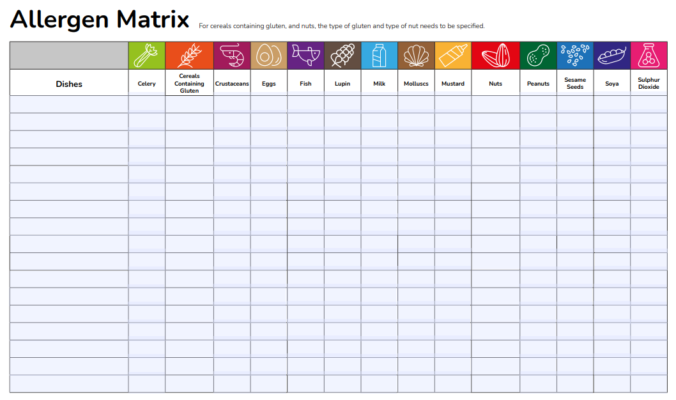Allergens are ever-present in the world of food and drink, and can pop up in places that most people wouldn’t necessarily assume. In this article that featured in the December 2022 edition of our Catering Quarterly magazine, we run through just how prevalent allergens can be in our favourite beverages, and also how to handle them effectively.
The Food Information Regulations require that the 14 main allergens must be identified in food and drink products. Food business operators, including manufacturers of alcoholic drinks, must notify consumers when these allergens are present in a food or drink product. For prepacked products, this information should be clearly printed on the product label in the form of an allergen warning.
Allergen information should accompany casks or barrels supplied by breweries or wholesalers. If this information is missing you can request it from the supplier or use the Cask Finder App, which contains a wealth of information on beers and ales, including which allergens are found in the different varieties.
If you run or are involved with a food and drink business, the chances are you will work with allergens and will need to know how to work safely with them and convey the necessary information regarding allergens to customers to remain compliant. Luckily for you, NCASS has a handy, intuitive and informative Allergen Awareness Course available online that will help you get and stay on top of your allergen awareness and importantly help you trade in line with relevant allergen laws and regulations.
Take the Allergen Awareness Course
The main allergens found in alcoholic drinks are gluten and sulphites. Nevertheless, other unexpected allergens can also be present hence why it is important to check and have a good understanding of the contents of all the products that you sell. For example, there are many different flavoured beers and ciders on the market that contain traces of one of the 14 allergens to enhance the flavour. For example shellfish, which is a mollusc allergen, or peanut butter, which is a peanut allergen.
It is important to identify the specified allergens in any drinks that you prepare from scratch, such as cocktails, as well as those in any prepacked or readymade drinks that you serve. It is advisable to record allergen information in an Allergen Matrix such as the one shown below. Don’t forget to include allergen ingredients that are used for garnish or decoration such as a celery stick in a Bloody Mary. Allergens could also be highlighted on drinks menus or via signage placed on the bar for customers to see.

Are there cross contamination risks?
It is important to be aware of your use of allergens within the business so you can manage the risks of cross contamination. Cross contamination can occur at all stages of drink preparation including delivery, storage, preparation, service and as a result of cleaning practices.
Always ensure that any equipment used such as glasses, blenders and shakers, are thoroughly cleaned before use. Also be sure to store allergen ingredients in separate sealed containers as this will remove any risk of cross contamination.
What do I have to look out for when it comes to gluten?
Most beers, lagers and sometimes even ciders, contain gluten cereals such as barley, wheat, oats and rye and are therefore not suitable for people who are Coeliac or gluten intolerant. Check the product label for allergen warnings to be certain. You may want to include some gluten free alternatives as part of your offering. If so, make sure these are from a reputable manufacturer or supplier who can verify that the product is gluten free.
Some spirits may also contain gluten. It is important to check for allergen warnings on the bottle to see if gluten remains present in the product after the distillation process.
What about nuts?
Peanuts and tree nuts e.g., almonds, walnuts and pistachios, are specified allergens. Some beers, as well as some spirits such as Southern Comfort, contain nut derivatives.
Other drink products which contain nuts are:
• Almond syrups used in many cocktails, often referred to as ‘Orgeat’ and ‘Falernum’ on cocktail menus. Similarly, almond sparkling wine, Amaretto and Galliano liqueur contain almonds.
• Hazelnut derivatives can be found in some liqueurs such as Crème d’amande and Crème de Noyaux as well as in some beers such as Dirty Squirrel by Phillips Brewing & Malting Co. and Stubs Old Crow Hazelnut Porter by Alameda Brewhouse.
• Peanuts (also known as ground nuts) can be found in Harp Lager and in peanut flavoured vodkas and liquors such as Castries Peanut Rum Crème.

I use egg whites in some cocktails, what should I be aware of?
Eggs are also a specified allergen. If you are using eggs to create fizz or body in your cocktails then be sure to take steps to minimise cross contamination during preparation. Be careful not to contaminate other surfaces and equipment such as glasses and carry out effective handwashing and cleaning after handling eggs. This is important in terms of maintaining general hygiene standards and in the prevention of allergen cross contamination.
Is there hidden milk in some drinks?
Lactose (milk) sugar is frequently used in stouts and low-alcohol beers. Many cocktails have milk ingredients e.g. White Russians, Pina Colada, Lumumba, Panda Bear and Brown Cow. Baileys liqueur contains cream and some ready-made margarita cocktails contain milk.
Milk can be present in drinks where customers may not expect it to be. Providing an allergen matrix can help you and your customers be clear on any allergens present.
If a customer asks you about the presence of a specific allergen whilst the bar is busy and there are lots of customers to serve, it can be a challenge to check whether this is the case.
Hence why it is better to be prepared and have this information already to hand. That way you can focus on making great drinks for your customers to enjoy and they can use the information that you provide to make informed decisions that will keep them safe.
Are people allergic to sulphites?
Yes, sulphur dioxide, also known as sulphites, is often used as a preservative in dried fruit, meat products, soft drinks, wine, beer and vegetables. If a person has asthma then they have a higher risk of developing a reaction to sulphur dioxide. If present above the specified levels then it will be highlighted on bottles of wine and beer.
How should I communicate allergens in my drinks to my customers?
Allergen information can be communicated either verbally or in writing. For example, on menus and signage or via an allergen record folder which is available at the bar for customers to review.

I serve bar snacks that are kept in jars on the bar, what should I do?
You need to be clear on the allergen content of any bar snacks that you serve. It is advisable to retain the ingredients list from the packaging to ensure you are aware of any allergens and so that you can provide information to customers. It is also worth labelling the jars to highlight specified allergens.
What happens if something goes wrong?
Common mistakes that businesses can make are:
• Offering products that are ‘free from’ allergens but forgetting to assess the risks from cross contamination and inadvertently introducing allergens into a product.
• Adding last minute ingredients and then not realising that this has introduced allergens to a product e.g., relish added to a drink as decoration, or offering a last minute bar snack.
• Taking a guess and providing incorrect information to a consumer instead of accurately checking the ingredients.
The consequences of getting it wrong could be serious for someone suffering with a severe food allergy. If a customer has an allergic reaction to one of your drinks then you must review the circumstances to determine if incorrect information or advice was given and if you were aware of the presence of an allergen.
Ensure that lessons are learnt and the allergen information system is improved. Likewise do the same if there is a ‘near miss’ incident so you can prevent a serious incident occurring later. Remember; good management requires constant monitoring of these risks.
How can NCASS help me with managing allergens?
Allergens in drinks can no longer be ignored. Taking a keen interest and being proactive, not only helps to avoid any unpleasant problems further down the line, but will also highlight your business as one that cares about legal compliance and prioritises their customers’ well-being.
NCASS have provided members with guidance on allergen management in the NCASS Safety Management System. We have included a template of an Allergen Matrix and ingredient/product specification record sheets. These are also available to download from the additional resources area of the website. Within the NCASS food safety risk assessments, allergen controls are now incorporated at each stage of food processing to support with the development of an allergen management system and compliance with updated regulations.
Furthermore, the NCASS Allergen Awareness course is available now: This online course will be invaluable to anyone who wants to enhance their knowledge of allergens and familiarise themselves with practical tips to ensure the compliance of their business – NCASS members can access the course at a discounted rate!






 Featured Training
Featured Training
OUR MEMBERSHIP
We're here to help make your catering business a success. Whether that be starting up or getting on top of your compliance and marketing. We're here to help you succeed.
Want our latest content?
Subscribe to our mailing list and get weekly insights, resources and articles for free
Get the emails